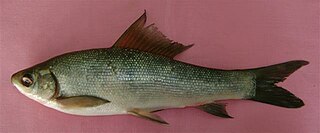
The rohu, rui, ruhi or roho labeo is a species of fish of the carp family, found in rivers in South Asia. It is a large omnivore and extensively used in aquaculture.

Catla, also known as the major South Asian carp, is an economically important South Asian freshwater fish in the carp family Cyprinidae. It is native to rivers and lakes in northern India, Bangladesh, Myanmar, Nepal, and Pakistan, but has also been introduced elsewhere in South Asia and is commonly farmed.

The Kuria labeo is a species of fish in the carp family, Cyprinidae. It is native to Pakistan, India, Bangladesh, and Burma, and it is known from Afghanistan and Nepal.

The orangefin labeo is a fish of the carp family Cyprinidae, found commonly in rivers and freshwater lakes in and around South Asia and South-East Asia. Native to Bangladesh and India.

Labeo barbatus is fish in genus Labeo which occurs in the Lower and Central Congo River basin.

Labeo batesii is a species of fish in the genus Labeo from the Lower Guinea region of west Africa.

Labeo bottegi is fish in genus Labeo. It is known from Ethiopia, Kenya, and Somalia.
Labeo boulengeri is a fish in genus Labeo, a genus of carp. Like most fish of its genus, it is a generally tropical fish. It inhabits the Uebi Scelebi river of Ethiopia. It has a maximum length of 22.5 cm.
Labeo curriei is fish in genus Labeo. It is found in the Saint Paul River in Liberia. It may also be present in the Corubal River in Guinea-Bissau.
Labeo cyclopinnis is fish in genus Labeo. It is only known from the rapids of the Middle Congo River and the Ubangi river in Africa.

Labeo dyocheilus is fish in genus Labeo from southern Asia.
Labeo forskalii is fish in genus Labeo from Northeast and East Africa. The maximum total length of the species is 36 cm (14 in). It is under heavy fishing pressure in Uganda.
Gregori's labeo is fish in genus Labeo. It is found in the Tana and Galana Rivers in Kenya and Tanzania. IUCN reports it also from Juba, Somalia, and does not include Tanzania in the distribution area.

Labeo nandina is a species of fish in the genus Labeo which is found in north-eastern India, Bangladesh and Myanmar.

The Nile carp is a fish species in the genus Labeo. It feeds primarily on plankton, and is distributed along the entire Nile valley. It is generally believed to be the fish that swallowed the phallus of the Egyptian god Osiris in the myth regarding his death at the hands of his brother Seth.

Labeo pangusia is a species of fish in the genus Labeo. It occurs in mountain streams, lakes, river and ponds in northern India, Bangladesh, Pakistan, Bhutan and Nepal. Its populations are declining, the main cause seems to be the damming of the waters it lives in so that explosives can be set to catch other fish. This species is of minor importance for human consumption.
Labeo polli is a species of fish in the genus Labeo from the Congo Basin. It is found only in the Kafubu River (Haut-Katanga) and the Kanshéle River (Kivu).
Labeo rectipinnis is a species of fish in the genus Labeo.
Labeo senegalensis is a species of freshwater ray-finned fish in the genus Labeo from West Africa.
Labeo sorex is a species of cyprinid fish from the genus Labeo found in rapids of the Congo River Basin in Africa.











